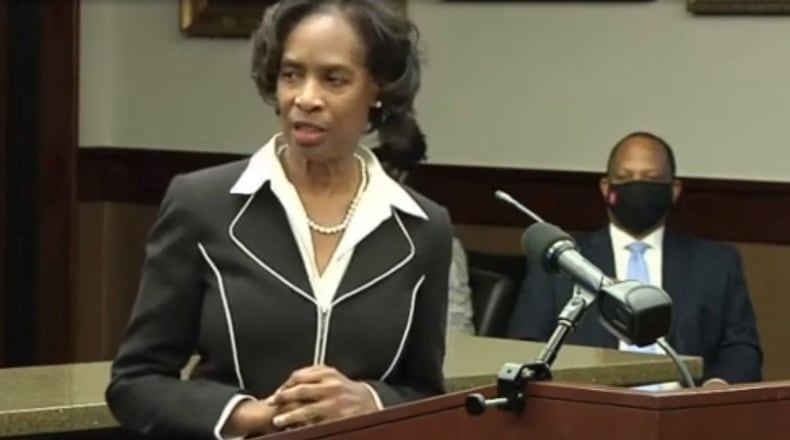Cobb County Superior Court Clerk Connie Taylor — embroiled in controversy throughout much of her first term — handily won reelection Tuesday, according to unofficial returns.
Taylor, a Democrat, first came under fire in 2022 for taking passport processing fees as personal income: more than $425,000 in less than two years, an Atlanta Journal-Constitution investigation found. She has also been investigated by the GBI for alleged violations of Georgia’s Open Records Act.
Multiple attorneys who practice in Cobb Superior Court have told The Atlanta Journal-Constitution that Taylor’s office has also struggled to maintain proper record-keeping for the court, which is her main duty as an elected constitutional officer. That has resulted in severe disruptions to court functions this year, they said.
Taylor did not respond to requests for comment.
Taylor defeated Republican challenger Deborah Dance, a former Cobb County Attorney, who said she came out of retirement to fix the issues in the clerk’s office. Taylor received about 54%, defeating Dance by more than 33,000 votes, according to unofficial results.
“I remain deeply concerned about the ongoing issues surrounding Connie Taylor’s administration, including the unresolved GBI investigation and possible prosecution, along with her unwillingness to address the public at any time during the race,” Dance said in a statement.
Cobb attorneys and judges say dysfunction within the clerk’s office has caused repeated delays within the county’s court system and hindered access to vital documents and court information. Taylor also changed the filing system, attorneys said, making it difficult for them to access documents that had previously been available free of charge. In addition, some judges and attorneys say longtime court employees left the clerk’s office under Taylor’s leadership.
Cobb Superior Court Chief Judge Gregory Poole took the extraordinary action of declaring a judicial emergency earlier this year due to the disruptions caused in part by the new filing system.
“I think that there have been so many people that have been fired and who have left because of the working conditions, it just makes it very difficult to work for that office, and everyone in the courthouse knows it,” Poole said to the AJC at the time. “There’s no way around it. It is a leadership issue.”
The order, which set aside filing deadlines and eliminated penalties for missed hearings, lasted 60 days and expired in October.
Marietta attorney Chuck Boring said many of Cobb’s attorneys set aside liberal political affiliations to support Dance “because people in the legal community know what a dumpster fire the clerk’s office is right now under Connie Taylor.”
Credit: Ben Hendren
Credit: Ben Hendren
He said many of his colleagues are unhappy with the outcome of Tuesday’s election.
“I think everyone feared that the electorate would just vote along party lines, but hoped enough folks would crossover,” Boring said. “But they didn’t.”
While the major issue of attorneys being unable to access documents in the system has largely been resolved, Superior Court Administrator Christopher Hansard said there are still “outstanding concerns that the court has with the clerk’s office.”
Notices instructing people when to show up to court haven’t been sent out in some cases, or are not being sent within the required timeline. And some employees still struggle to access documents online, he said.
Credit: Miguel Martinez
Credit: Miguel Martinez
“I don’t know why we continue to pay Connie Taylor for work she doesn’t do,” said Marietta attorney Ashleigh Merchant. “The court hasn’t even been able to function because of her.”
“A race like that, I don’t even understand why it’s partisan, and the rest of the legal community doesn’t either,” Merchant said. “They just want someone who’s doing their job.”
Dance had raised over $50,000 for her campaign — significantly more than Taylor’s roughly $20,000. Several of those donations came from Cobb’s legal community, including Boring’s law firm Robbins, Alloy Belinfante and Littlefield, which gave $1,500. Freeman Mathis & Gary gave $3,000, and Frye Law Group contributed $2,500, according to campaign disclosures.
Taylor also received contributions from the legal community, most notably from former Gov. Roy Barnes’ law firm, which gave $3,300.
Taylor first drew scrutiny in 2022 for taking passport fees as personal income — a legal practice under Georgia law that allows clerks, whose offices take on the additional work of processing passports applications, to supplement their income with those fees. Taylor made over $425,000 through the practice in her initial two years in office, atop her six-figure salary.
Dance campaigned on a promise to not accept any of the passport fees as income.
Some state lawmakers tried to change the law but failed to gain support for eliminating the practice. Any officer taking passport fees are now required to report the totals to the county government annually.
Taylor then faced a GBI investigation after a whistleblower employee alleged Taylor ordered her to delete records related to the passport fees instead of turning them over to the AJC under the Georgia Open Records Act. The GBI’s investigation has been referred to the attorney general’s office for prosecutorial review.
Keep Reading
The Latest
Featured






